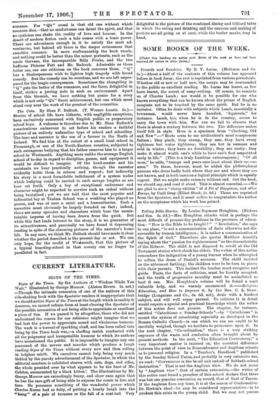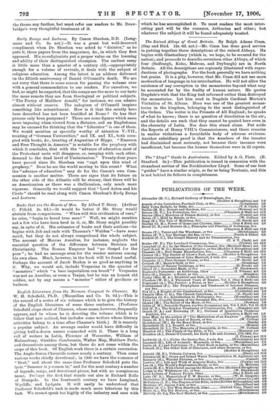Telling Bible Stories. By Louise Seymour Houghton. (Bickers and Son.
3s. 6d.)—Mrs. Houghton attacks what is perhaps the most difficult of present-day problems in the province of educa- tion : " How is the Bible to be taught ? " " Revelation," she says in one place, "is not a communication of facts otherwise not dis- coverable by human intelligence ; it is rather a communication of the Spirit of God." Elsewhere she quotes Matthew Arnold's saying about the " passion for righteousness " as the characteristic of the Hebrew. The child is not disposed to revolt at the Old Testament stories which shock his elders. The writer of this notice remembers the indignation of a young learner when he attempted to soften the doom of Daniel's accusers. The child insisted on the uttermost farthing; the children were to be torn in pieces with their parents. This instinct the teacher must recognise and guide. Facts, the facts of criticism, must be frankly accepted, and the truth of progressive morality must be assimilated as best it can. Mrs. Houghton's volume will be found a most valuable help, and we warmly recommend it.—Religious Education, and How to Improve it, by the Rev. C. L. Draw- bridge (Longmans and Co., 3s. 6d. net), deals with a kindred subject, and will well repay perusal. To criticise it in detail would require a special and practical knowledge which the writer of this notice does not possess. The chapter, for instance, entitled "Catechisms v. Sunday-Schools "—by " Catechisms " is meant the system of catechising especially as developed in the Roman Catholic Church—is one which we can see ought to be carefully weighed, though we hesitate to pronounce upon it. In the next chapter, "Co-ordination," there is a very striking exposure of the waste and confusion often brought about by present methods. In the next, "The Education Controversy," a very important matter is insisted on, the essential difference between the point of view in Nonconformist and Anglican schools as to personal religion. In a "Teacher's Handbook" published by the Sunday School Union, and probably in very extensive use, we read : "CONVERSION is the be-all and end-all of Sabbath-school instruction." That is not the Anglican view. We do not mean by " Anglican view " that of certain extremists,—the writer of this notice once heard a preacher of this school declare that there was but one genuine conversion on record, that of Saul of Tarsus. If the Anglican fixes any time, it is at the season of Confirmation. Dr. Horton's ideal—he may be considered representative—is to produee this crisis in the young child. But we may not pursue
the theme any further, but must refer our readers to Mr. Draw- bridge's very thoughtful treatment of it.



























































 Previous page
Previous page